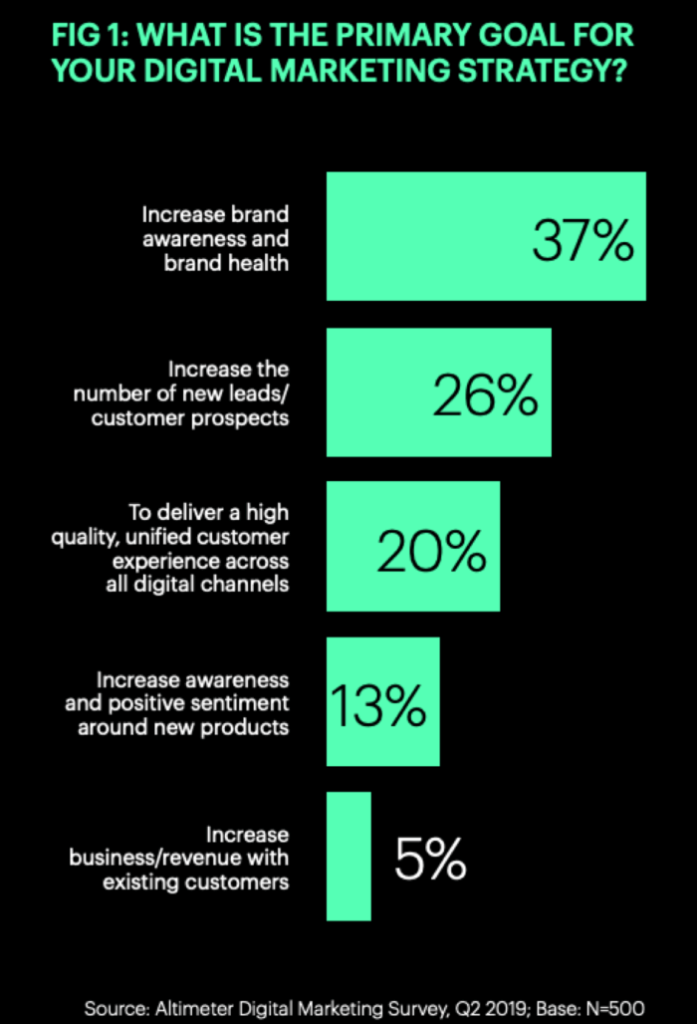Chart of the Week: 37% of marketers say increasing brand awareness is the main goal for 2019 but it is not a measure of success.
Increased brand awareness brings with it a range of benefits, including increased traffic, brand advocates and possibly more sales. It’s not surprising then that that over a third (37%) of marketers cite increasing brand awareness and brand health as their top priority for digital marketing in 2019.
According to Altimeter by Prophet’s global survey of 500 senior digital marketers, brand awareness is still a big priority across the world. However, the research revealed that there are a lot of different priorities when it comes to digital marketing, with the focus being split across several areas.
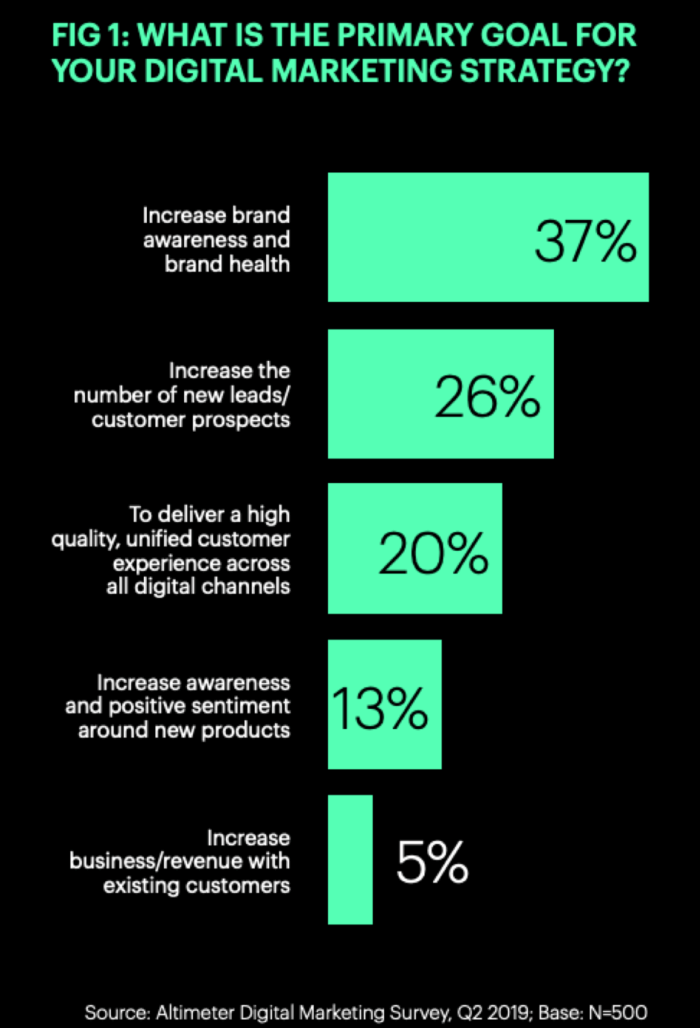
2019 digital marketing goals
Over a quarter (26%) of marketers say that their primary goal for their digital marketing strategy this year is to increase the number of new leads/customer prospects. Arguably, this leads to brand awareness, with more leads likely to be a direct result of increasing the awareness of your brand.
A further 20% said they were aiming to deliver a high quality, unified customer experience across all digital channels. This is a beneficial goal when it comes to getting customers to complete a purchase, as well as increase the chances of positive reviews and testimonials, which can aid with attracting new customer prospects.
Interestingly, just 5% of respondents said that their goal was to increase business/revenue with existing customers, removing focus from customer re-engagement. As re-engaging existing customers can be cheaper and deliver better ROI than attracting new customers, this is a rather surprising statistic.
2019’s marketing challenges
Although many organizations have successfully transformed their marketing to take on the digital space, it is often the case that they struggle to scale this transformation in line with the rest of the business.
One of the biggest challenges in this respect, according to the research, is finding the right talent within the digital marketing sphere. Some 55% said that the top challenge for digital marketing within their company is hiring the right skills/people, suggesting that they are experiencing gaps in the required skills needed to get the best possible results from their marketing efforts.
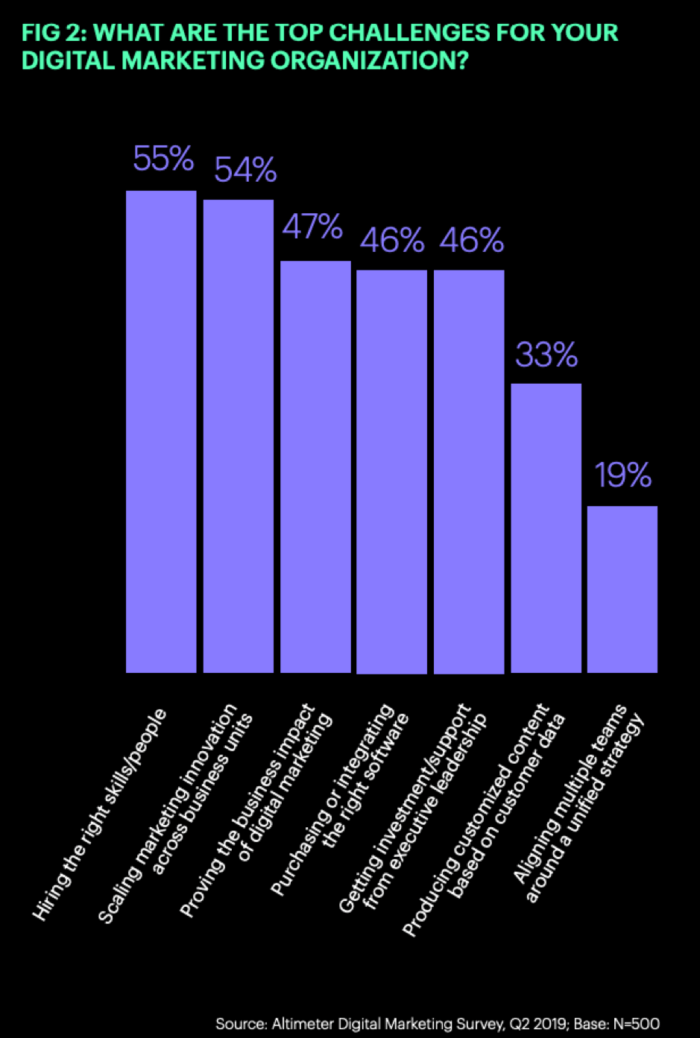
On top of this, 54% said they were struggling to scale marketing innovation across business units. This is likely at least partially due to a lack of employees with the necessary skills and knowledge, as well as struggling to see what tools would be best suited to an organization in order to manage marketing innovation. This is supported by the fact that 46% said that purchasing or integrating the right software was a challenge.
Surprisingly, just 19% said that aligning multiple teams around a unified strategy was their main challenge for this year. This suggests that businesses are dealing with the issue of siloed teams and are improving overall internal communications, allowing for better delivery of a digital marketing strategy.
Marketing skills needed in 2019
So what are the skills that companies are looking for when it comes to hiring in the digital marketing industry? Traditional digital marketing skills are no longer at the top of the list, with just 8% saying SEO/SEM expertise and 6% saying paid media/programmatic advertising.
Instead, 41% of respondents pegged data analysis as being the skill they need most. This reflects a growing need to better be able to report on marketing efforts in order to prove ROI. It also means that companies are able to use more data-driven marketing tactics, such as personalization and data-driven targeting, which is likely why 38% said they look for hires with marketing automation/software expertise.
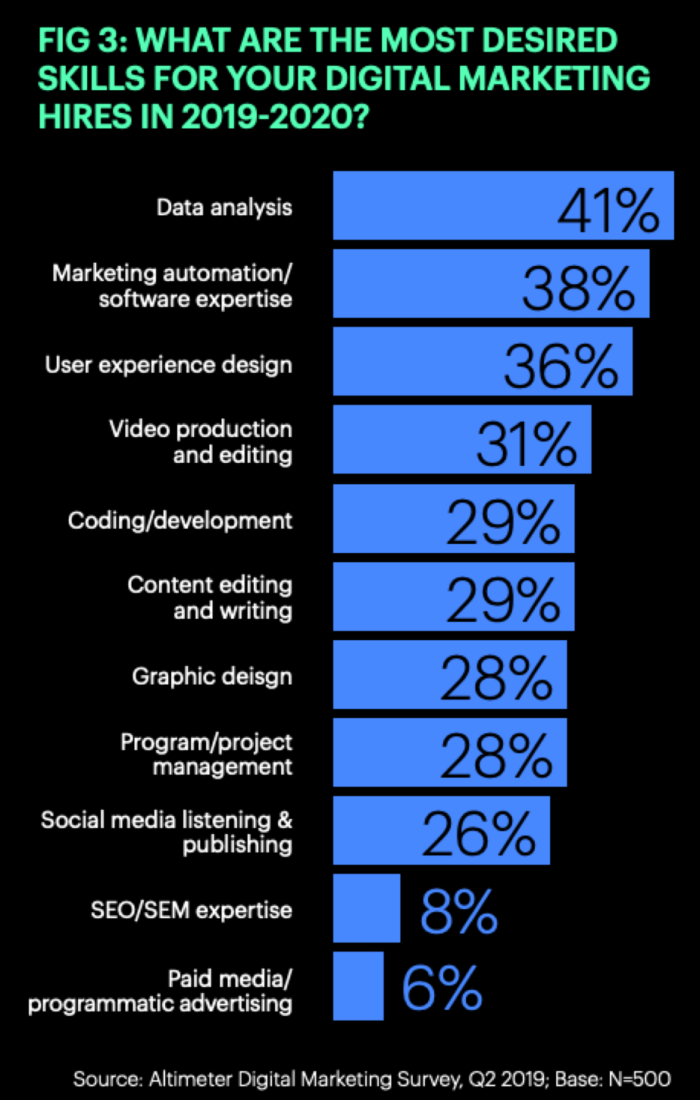
While SEO may be at the bottom of the list, content editing and writing is still a skill desired by almost a third (29%) of respondents, with a further 31% saying video production and editing are important skills. This suggests that companies now want more from their content than rankings, with the rise in required video skills showing that engagement and shareability are likely important factors.
How are marketers measuring success?
Despite the lack of focus on re-engaging existing customers, customer loyalty/customer lifetime value is cited by 61% of respondents as being a primary metric used to measure digital marketing success. While some customers will become repeat customers if they are happy with the service provided, failing to actively keep them engaged could mean that results are not indicative of success in terms of gaining new customers.
Over half (55%) still use direct revenue as a primary metric to show marketing success. While an overall picture of revenue gives a good indication of how a company is performing, this could benefit from being segmented in terms of new and existing customers, as this could indicate where efforts need to be focused.
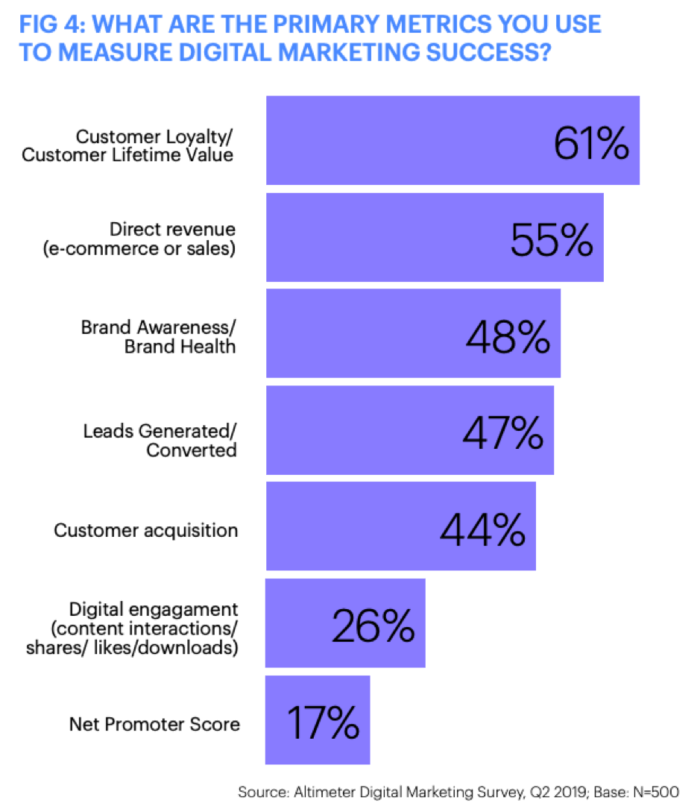
Interestingly, less than half (48%) of digital marketers use brand awareness/brand health as a metric to measure success, despite this being the number one goal. This suggests that marketing goals may not always be aligned with overall business goals, which can cause issues, including getting buy-in for campaigns.
Marketers are also being asked to deliver results that are not part of the tradition top-of-the-funnel metrics, which means there could be expectations that they take on duties usually assigned to other departments, such as sales. This is likely to affect the overall effectiveness of marketing campaigns as marketers attempt to deliver on multiple goals.
Channels delivering ROI
When it comes to ROI, there are a number of channels that seem to perform particularly well. Perhaps unsurprisingly when you consider the number of available platforms, social media came out top of the pack, with 69% saying it is most effective (when combining both organic and paid social).
With different channels helping to deliver for both B2C and B2B companies, as well as allow for the targeting of different audiences, social media has become a vital channel for building brand awareness, driving traffic and delivering conversions.
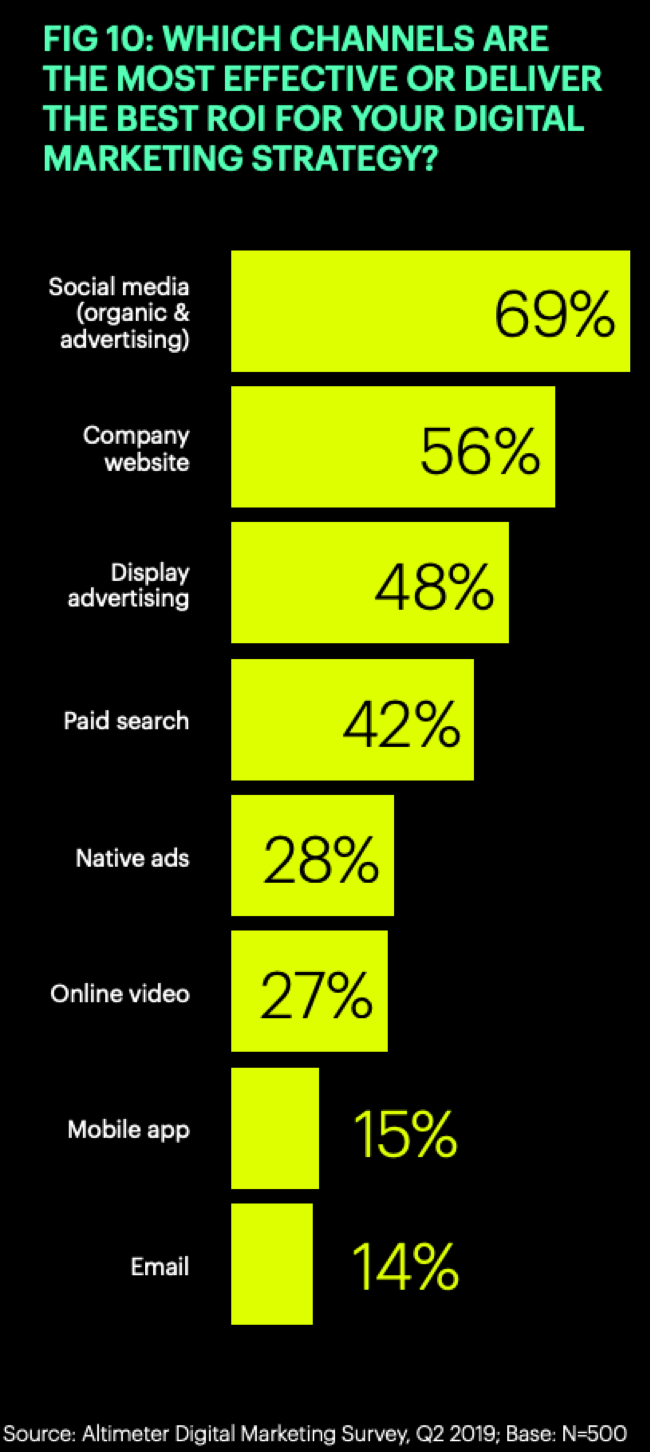
The second most effective channel for delivering ROI for a digital marketing strategy is company websites, selected by 56% of respondents. This is likely due to the fact that businesses have a lot more control over the customer experience offered, the content on show and how their brand is perceived. However, it’s surprising that websites are not viewed as delivering better ROI than social media.
Another surprise, considering how effective a channel it can be, is that only 14% say email is the most effective channel for digital marketing ROI. This may be due to marketers failing to implement the most effective email types, with triggered emails driving the best performance over business-as-usual emails. The fact that inboxes are now getting more and more cluttered may also be a factor as companies see open rates start to decline.
Top initiatives for the next 12 months
Following on from data analysis being the most desired skill among marketers in 2019 and customer lifetime value being the primary measure of success, the initiative that 51% of respondents are most likely to say is a priority for the next 12 months is related to data and the customer journey.
Over half say that they are focusing on ‘using more data to create the customized content that serves the customer journey’, showing that personalization is still a key consideration for marketing departments. This is further supported by the fact that 50% are looking to ‘invest in technology that enables real-time delivery and personalization of data’ in response to customers continuing to seek personalized experience.
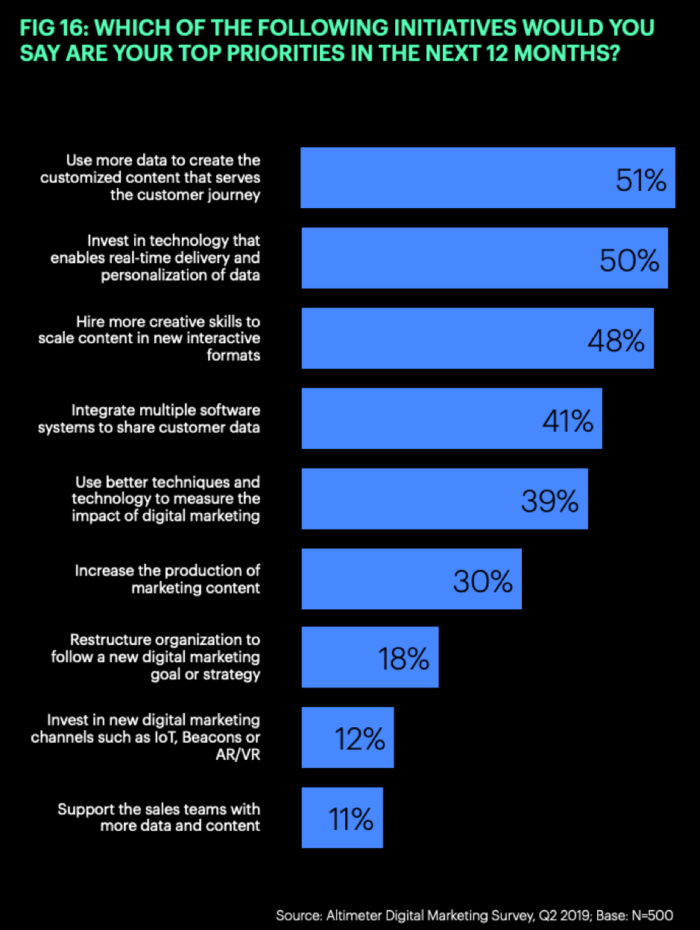
Despite the fact that better joining the efforts of sales and marketing can help deliver an improved experience for both new and existing customers, just 11% of marketing departments said that ‘supporting the sales teams with more data content’ was a priority for the next 12 months.
Final thoughts
Although brand awareness is the main goal for marketers over the next year, this isn’t necessarily reflected in the way they measure success or the skills that are desired among new hires. This can mean that marketing departments are pulled in different directions as they attempt to achieve their own goals, as well as others that are usually assigned to different areas of the company.
Ensuring that there is communication between different areas of a business and a sharing of ideas, data and content – such as with sales departments – can ensure all goals are lined up while the right measures of success are being used.
